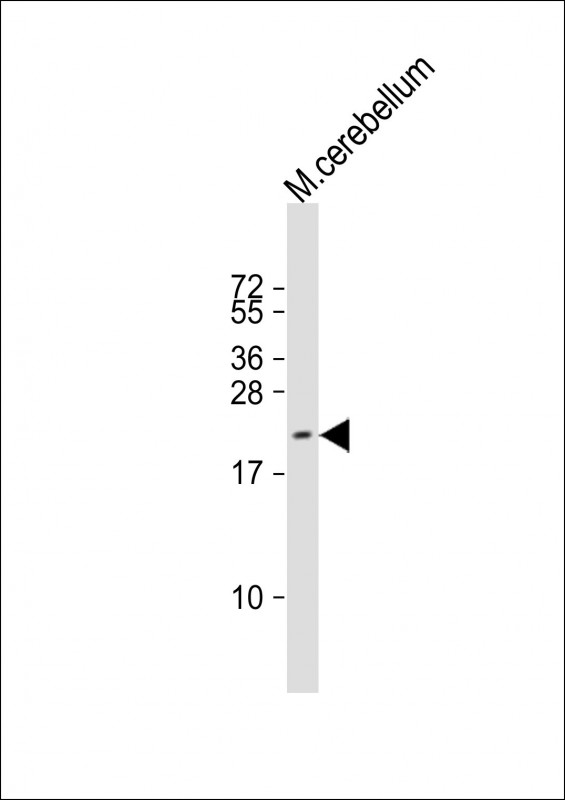
| WB | 1/1000 | Human,Mouse,Rat |
| IF | 咨询技术 | Human,Mouse,Rat |
| IHC | 咨询技术 | Human,Mouse,Rat |
| ICC | 技术咨询 | Human,Mouse,Rat |
| FCM | 咨询技术 | Human,Mouse,Rat |
| Elisa | 咨询技术 | Human,Mouse,Rat |
| Aliases | Ras-related protein Rap-2a, RbBP-30, RAP2A |
| Entrez GeneID | 5911 |
| WB Predicted band size | 20.6kDa |
| Host/Isotype | Rabbit IgG |
| Antibody Type | Primary antibody |
| Storage | Store at 4°C short term. Aliquot and store at -20°C long term. Avoid freeze/thaw cycles. |
| Species Reactivity | Human, Mouse, Rat |
| Immunogen | This RAP2A antibody is generated from a rabbit immunized with a KLH conjugated synthetic peptide between 16-38 amino acids from human RAP2A. |
+ +
以下是关于RAP2A (N-Term)抗体的3篇参考文献及其摘要概括:
1. **文献名称**:*RAP2A regulates cell migration via modulation of Rho family GTPases*
**作者**:Zhang Y, et al.
**摘要**:研究利用RAP2A (N-Term)抗体进行Western blot和免疫共沉淀实验,证实RAP2A通过调控RhoA和Cdc42活性影响细胞迁移和侵袭能力,揭示其在肿瘤转移中的潜在作用。
2. **文献名称**:*Characterization of a novel monoclonal antibody against RAP2A for intracellular signaling studies*
**作者**:Tanaka K, et al.
**摘要**:该文献报道了一种针对RAP2A N端表位的单克隆抗体的开发与验证,通过siRNA敲低和质谱分析证明其特异性,应用于免疫荧光技术检测RAP2A在细胞中的动态定位。
3. **文献名称**:*RAP2A interacts with mTORC1 to regulate autophagy in neuronal cells*
**作者**:Liu H, et al.
**摘要**:研究使用RAP2A (N-Term)抗体进行免疫印迹和免疫组化,发现RAP2A通过结合mTORC1复合物调控神经元自噬,为神经退行性疾病机制提供了新见解。
The RAP2A (N-Term) antibody is a polyclonal or monoclonal antibody specifically designed to target the N-terminal region of the RAP2A protein, a member of the RAS oncogene family. RAP2A (Ras-related protein Rap-2A) is a small GTPase involved in intracellular signal transduction, regulating diverse cellular processes such as cytoskeletal organization, cell adhesion, and membrane trafficking. It cycles between an active GTP-bound state and an inactive GDP-bound state, interacting with effector proteins like MAPK cascades to influence cell proliferation, differentiation, and apoptosis.
This antibody is commonly used in research applications like Western blot (WB), immunofluorescence (IF), and immunohistochemistry (IHC) to detect endogenous RAP2A expression in tissues or cell lines. Its specificity for the N-terminal domain helps distinguish RAP2A from closely related isoforms (e.g., RAP2B, RAP2C) or other RAS family members (e.g., RAP1A/B), minimizing cross-reactivity. Validation typically includes testing against knockout controls or recombinant proteins to confirm target recognition.
RAP2A has been implicated in cancer, neurological disorders, and immune regulation, making this antibody a valuable tool for studying its role in disease mechanisms. Host species (e.g., rabbit, mouse) and clonality (monoclonal vs. polyclonal) may vary by supplier, but most commercial versions are affinity-purified to ensure high sensitivity and reproducibility. For accurate interpretation, experimental conditions (e.g., sample preparation, antibody dilution) should align with validated protocols.
×